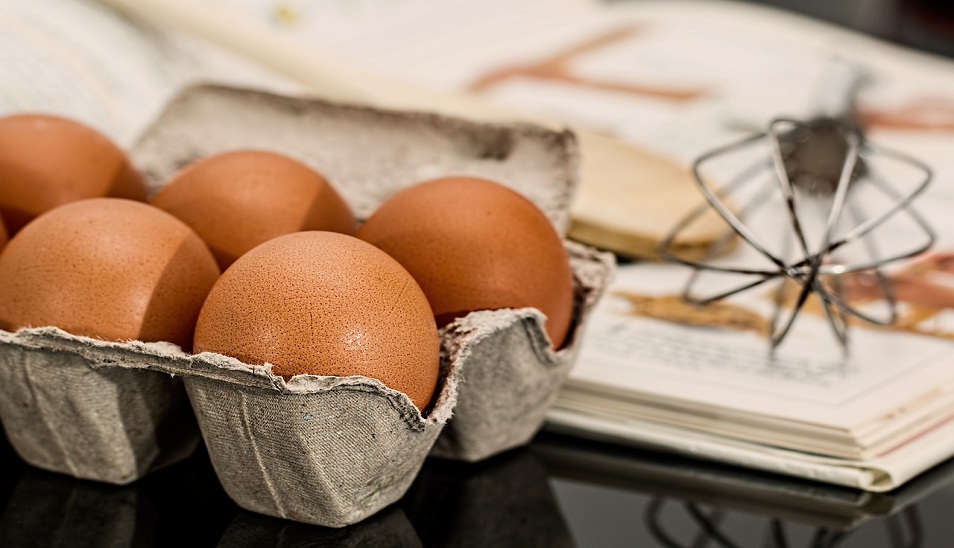7 Ways to Boost Energy Levels
 Feeling zapped? You’re not alone. One of the most common questions CardioTabs founders, James O'Keefe, MD, and Joan O'Keefe, RD, hear from patients is how to improve energy levels. Follow these top ways to boost your energy naturally without caffeine and you’ll be feeling better in no time!
Feeling zapped? You’re not alone. One of the most common questions CardioTabs founders, James O'Keefe, MD, and Joan O'Keefe, RD, hear from patients is how to improve energy levels. Follow these top ways to boost your energy naturally without caffeine and you’ll be feeling better in no time!
1. Vitamin D Autumn days are shorter. Less daylight and the angle of the sun make it near impossible for your body to manufacture the vitamin D you need. Vitamin D is actually a hormone and when depleted, you feel tired, depressed, achy and sometimes miserable. Vitamin D is also important for immune health.* We recommend a daily supplement of 2,000 IU vitamin D3. (Make sure you are taking D3.) If you suspect a vitamin D deficiency, ask your doctor to test your vitamin D levels.
2. Hydrate Are you drinking enough water? One of the most common and often overlooked reasons for a lack of energy is simply dehydration. Even mild dehydration can lower cognition, cause “brain fog,” and make you feel sleepy. A simple rule - check your urine. It should be pale yellow or clear. If it’s not, drink water. Avoid caffeinated drinks like coffee, as they may have a diuretic effect. Flavor your water with cucumber, lemon, orange slices or berries.
3. Move! Yes, you’ll hear this advice from us time and time again, but that’s because it works. When you’re feeling groggy, take ten minutes to go for a brisk walk in fresh air, get up from your desk and stretch, climb the stairs at work, turn on your favorite song and dance, or my favorite, hold an imaginary jump rope and jump 100 times. Get in the habit of standing up and strolling while speaking on your cell phone - why do you think it’s called a MOBILE phone?! Phone conversations are an underutilized opportunity to get up and get moving.
4. Examine your lunch Most of us know the feeling of the mid-afternoon slump. Avoid it by eating the right lunch. Too many simple carbohydrates and not enough protein and fiber at lunch causes your blood sugar level to spike, in turn, your body releases insulin to bring it down, otherwise known as “crashing.” Avoid this by eating a lunch full of color and lean protein.
5. Check your CoQ10 levels CoQ10 is a key enzyme used in the mitochondria, the little power plants where our cells generate and store nearly all of the energy needed to power our bodies. The brain, heart, and muscles, because of their high energy requirements, are especially dependent upon adequate levels of CoQ10 for optimal function.* Replenishing more youthful CoQ10 levels can help promote cellular energy production.*
6. On a Statin? Over 45? Taking a statin drug to lower your cholesterol? Both simple aging and statin drug use are associated with low levels of coenzyme Q10 (CoQ10). Your cells need CoQ10 to produce energy. When it’s depleted, you are too. If you are physically active, you may notice it even more than others. A daily supplement will help, but be careful. Our bodies have a difficult time absorbing CoQ10 in many supplement forms. We recommend 150 mg of highly absorbable CoQ10 in ubiquinone form.
7. Schedule tea time Tea is a powerful antioxidant and contains natural compounds that can boost clarity, mood, and energy levels – even decaffeinated tea has this power. Green tea is best, but black tea is also a great choice. Add lemon, orange peel, or mint, but please don’t add sugar or artificial sweeteners as these negate the effects. Our family drinks a lot of tea, but we still don’t drink enough to enjoy the maximum benefits. A daily supplement, like CardioTea, provides the mood-boosting effects of tea and can help promote healthy weight loss.*
In Good Health,
James O'Keefe, MD
The Best Foods for a Quality Calcium Intake
 A diet rich in plants such as leafy greens, colorful vegetables and fruits will make your system less acidic, which is conducive for strong bones. However, plants are relatively poor sources of calcium compared to animal sources. Non-fat or low-fat dairy products such as skim milk and Greek yogurt are excellent sources of calcium, but many adults do not tolerate dairy due to lactase deficiency or milk allergies.
A diet rich in plants such as leafy greens, colorful vegetables and fruits will make your system less acidic, which is conducive for strong bones. However, plants are relatively poor sources of calcium compared to animal sources. Non-fat or low-fat dairy products such as skim milk and Greek yogurt are excellent sources of calcium, but many adults do not tolerate dairy due to lactase deficiency or milk allergies.
Adult human hunter-gatherers for millennia acquired most of their calcium by consuming animal bones, where it is found in a matrix of bone-building nutrients including magnesium, phosphorus, manganese, zinc, iron, copper, collagen protein and osteocalcin.
I know, eating bones during your meals is currently inconvenient and socially impolite, yet it may be a key to strong bones and soft supple arteries. Make stews using bones, letting them slow cook for hours. And if you like sardines, look for those with the skin and bones intact, packed in water with no added salt.
CardioTabs new bone supplement is rich with vitamin D3, vitamin K2, potassium and other key nutrients to promote bone density and heart health.*
In Good Health,
James O'Keefe, MD
photo credit: Pixabay Creative Commons
Eggs: Healthy or Harmful?

Could eating eggs regularly be as harmful to your health as smoking?! A Canadian study published online July 31, 2012, in the journal Atherosclerosis reported this finding, though I have real doubts about the validity of their conclusions. These researchers sent questionnaires to 1,200 men and women (average age about 61) who were followed regularly in a preventive heart clinic. The study showed that regular egg yolk consumption was linked with plaque progression in the carotid (neck) arteries.
Surprisingly, eating as few as three egg yolks per week seemed to predispose to an increase in plaque development. A larger and more impressive analysis of the egg dilemma came from the Physicians Health Study, which has been following 21,300 male doctors for 20 years. This study found that men who ate seven or more eggs per week were about 25 percent more likely to die from any cause compared to men who ate fewer than seven eggs weekly. Importantly, six or fewer eggs per week were not linked with increased risk of heart trouble or death. The cardiovascular risk of eating eggs seems to be higher in diabetics, probably because they are at such high risk for arterial plaque development, and thus are very sensitive to excess cholesterol in their diet.
Egg whites are a wonderfully healthy, cholesterol-free and lean source of high-quality animal protein. Eating an egg white omelet with vegetables like tomatoes, spinach, mushrooms and onions is about as nutritious as food gets. The USDA recommends limiting cholesterol intake from diet to less than 300 mg daily. A single yolk contains about 200 mg of cholesterol. I personally don’t miss the yolks at all, but if you do, try to limit yourself to not more than three yolks per week, and look for organic eggs that are high in omega-3 fats.
Father Jim is a friend and patient who raises chickens for eggs. I buy these free-range brown eggs from him every chance I get. He treats his chickens as if they were his children. Just before dark, he checks to see that they are all safely nestled into their roosts for the night. He worries about owls and other predators getting his beloved hens if they are left outside when darkness falls. If any of the birds have been chased up into the tree branches, Jim (a spry 75-year-old) props a tall ladder against the tree, and climbs up to rescue the stranded birds. He gently scoops up the chicken and places it into the safety of its coop for the night. To my vegan friends who shun all animal products because they cannot condone eating animals raised in inhumane conditions, I direct them to an egg producer like Father Jim.
These eggs come from hens who are nurtured with tender loving care, have the run of acres of chicken paradise, and wander about during the day feeding on bugs, seeds and other natural food sources. His chickens are about as happy and healthy as birds can be, and their eggs are loaded with wholesome protein that is ideal for rebuilding the tissue that is constantly being torn down in the course of day-to-day living. By adding ideal, clean protein, like organic fresh egg whites to your diet, you improve your health in many ways. Finally, eat locally grown food whenever you can. It tends to be fresher.
In Good Health,
James O'Keefe, MD
Photo Credit: Pixabay Creative Commons
The #1 Secret to Slow Aging and Prevent Disease

Hang with me for a moment as I explain a somewhat complex concept. If you can grasp this idea and deploy its strategies, it will revolutionize your life. You are probably oblivious to the most important factor determining the health of your diet. After a meal, the levels of glucose and triglycerides (fats) in your bloodstream fly under your conscious radar, and although they usually go undetected, these resulting spikes will eventually wreak havoc on your health and longevity.
Your system is a machine that will run smoothly and efficiently when you feed it the fuel for which it has been designed by nature. All of the energy necessary for you to move, to think, to grow, and to stay alive comes from your metabolic engine - which resides collectively within the mitochondria - the microscopic power generators, within each of your 100 trillion cells. Those little mitochondrial furnaces burn only two fuels - glucose and fatty acids, and the “smoke” that comes off from that metabolic fire needs to be tightly buffered and neutralized because otherwise, it can cause big trouble. This metabolic smoke consists of free radicals or pro-oxidants that, if not neutralized, will cause you to “rust from the inside out,” leading to premature aging and disease.
Just like throwing too much wood and kindling on a fire all at once will make it burn out of control causing toxic amounts of smoke to billow through the air, the “metabolic smoke” from eating a high-calorie, fast food meal will billow through your cells and pollute your system. After you gulp down a cheeseburger, large fries and a Coke, this massive slug of calories is digested almost immediately, leading to dramatic spikes in your blood sugar and fats.
This fuel “floods your engine,” causing the metabolic fires to churn out massive amounts of smoke in the form of free radicals like super-oxide anions. These toxic molecules oxidize your DNA which leads to premature aging and cancer, and oxidize your blood cholesterol, which leads to inflammation and disease in your arteries, heart and brain. Additionally, these spikes in glucose trigger corresponding spikes in insulin, which directs your body to store a lot of those extra calories as belly fat; causing a downward spiral because excess abdominal fat churns out inflammation and leads to hormonal disruptions that predispose to even higher spikes in glucose and triglycerides after eating.
Contrast that to what happens after a meal consisting of steamed broccoli, a salad of spinach and tomatoes drizzled with extra-virgin olive oil and vinegar, a modest serving of lean protein (skinless chicken breast or baked fish for example), with water and/or tea for your beverage, and berries for dessert. This straight-from-nature food has several advantages:
1) It is going to take much longer to eat than processed food because you are going to have to do a lot more “food-processing” (chewing) yourself, and an even longer time to digest.
2) The calories from this meal will trickle into your bloodstream never causing your blood glucose or blood triglycerides to rise above 100, and your metabolic engine will burn those calories cleanly as they arrive, rather than storing them in belly fat.
3) Furthermore, all of those natural pigments from the colorful plants are ANTI-oxidants that will bind to and neutralize the oxidants (smoke) thrown off by your engine as it burns the glucose and fats from the meal.
In reality, your body’s metabolism is mind-bogglingly complex and breathtakingly intelligent in its design and function, yet it can be simplified down to a practical take-home message: your machine will run best when you feed it only the natural fuel for which it’s designed. Fill the gas tank of your car with jet fuel and it will run poorly, and eventually this high-octane kerosene will ruin the engine. Eating modern, refined, processed, high-calorie foods will do the same to your body. I cannot overemphasize the fundamental and critical importance of this concept - if you want to stay youthful and healthy, you must avoid these post-meal spikes in glucose and fats. The 5 step strategy to do that will sound familiar:
1) Eat only whole, natural foods (that contain no more than one or two ingredients)
2) Balance your calories consumed with calories burned each day
3) Keep your waist size to half your height in inches
4) Exercise daily
5) Get seven to eight hours of sleep each night
In Good Health,
James O'Keefe, MD




